

Depictions of studios:

Bosporan Kingdom (on the Black Sea Coast),
Portrait Artist's Workshop Painted Sarcophagus
(detail), 1st century CE,
limestone, entire sarcophagus 81 x 215
x l 57 cm, State Hermitage Museum, St. Petersburg, Russia.
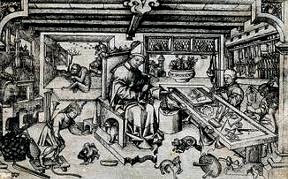
Master of Balaam, Dutch, St. Eligius in His Studio, c. 1450, engraving on paper, 11.5 x 18.5 cm, Rijksmuseum, Netherlands. A man in a bishop's mantle is working in a metalsmiths workshop. "The man is Eligius, patron saint of smiths. He is hammering a goblet into shape on his anvil. Three other people are working in the studio: a master smith and two apprentices. The table is covered with tools. On the right, hammers, tongs and files hang in orderly rows against the wall. On the left is the furnace."
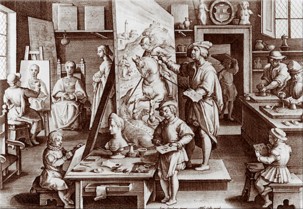
Jan van der Straet (Stradanus) (Dutch, 1523-1604),
Painter's
Studio, woodcut.
As the master paints
a large canvas
with a picture of St.
George and the Dragon at the center, an apprentice
paints a portrait from a model at left, two
make drawings
and one mixes colors
in the foreground, two
more grind pigments into
oil on the right, and a
last one carries a canvas toward the doorway. Windows let in
natural light from several angles. There are numerous
shelves, drawers and tables for supplies and works-in-progress.
See Dutch art.
![]()
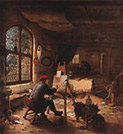
![]()
![]()
Adriaen van Ostade (Dutch, 1610-1685), The
Artist's Workshop, oil
on canvas. See easel
and mahlstick.
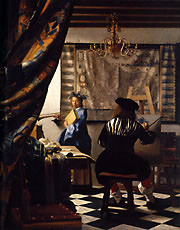
Johannes Vermeer (Dutch, 1632-1675), Allegory of
Painting (The Painter in His Studio), c. 1666, oil
on canvas, 130 x 110 cm,
Kunsthistorisches Museum, Vienna. The model personifies Clio,
Muse of History, holding
the trumpet of fame in her right hand and the chronicle of world
events in her left. Attributes
of other muses, including a mask,
lie on the table. These make the painter a narrator of stories.
See paint-by-number.
Gustave Courbet (French, 1819-1877), The Painter's Studio, A Real Allegory, 1855, oil on canvas, 11 feet 10 1/4 inches x 19 feet 7 1/2 inches (361 x 598 cm), Musée d'Orsay, Paris. See Realism.
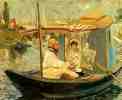
Edouard Manet (French, 1832-1883), Monet
Painting in His Floating Studio, 1874, Bayerische Staatsgemaldesammlungen,
Munich.
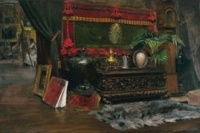
William Merritt Chase, A Corner of My Studio, c. 1895, oil
on canvas, 24 1/8 x 36
inches, Fine Arts Museums of San Francisco, CA. See Ten
American Painters.

Jefferson David Chalfant (American, 1856-1931),
Bouguereau's Atelier at the Academie Julian,
Paris, 1891, oil
on wood panel,
11 1/4 x 14 1/2 inches (28.6 x 36.8 cm), Fine Arts Museums of
San Francisco, CA. See academic,
atelier, and kitsch.

Henri Matisse (French, 1869-1954), The Red Studio (L'Atelier rouge; Le panneau rouge), 1911, oil on canvas, 71 1/4 inches x 7 feet 2 1/4 inches (181 x 219.1 cm), Museum of Modern Art, NY. See Fauvism.

Henri Matisse, The Painter in His Studio or The Painter
and His Model, 1917, oil
on canvas, 146.5 x 97 cm,
Centre Georges Pompidou, Paris. See model.

A reconstruction of the studio of Constantin
Brancusi (Rumanian, 1876-1956) is a part of the Centre Georges
Pompidou, Paris. Constantin Brancusi lived in Paris from 1904
until his death. He created the majority of his works in the
studios he occupied successively at 8 and 11 Impasse Ronsin in
the fifteenth arrondissement. In his will he bequeathed the whole
of his studio and its contents (his works, furniture, tools and
workbenches, documents, and books) to the French government on
the condition that the studio be reconstituted as it had been
in the Impasse Ronsin. In this photo is the entryway to Brancusi's
studio, where there are displayed two Endless Columns,
1925, and Bird in Flight, 1941. More photos of Brancusi's
studio can be found in Hideo
Nogami's English language article "L'atelier Brancusi — Saint's home where
Ezra Pound visited" on his website, From Modern to Postmodern. Also see sculpture.

Georges Braque (French, 1882-1963), The Studio, 1939, oil
with sand on canvas,
44 1/2 x 57 1/2 inches (113 x 146.1 cm), Metropolitan Museum
of Art, NY.
Also see atelier, bottega, and smock.
https://inform.quest/_art